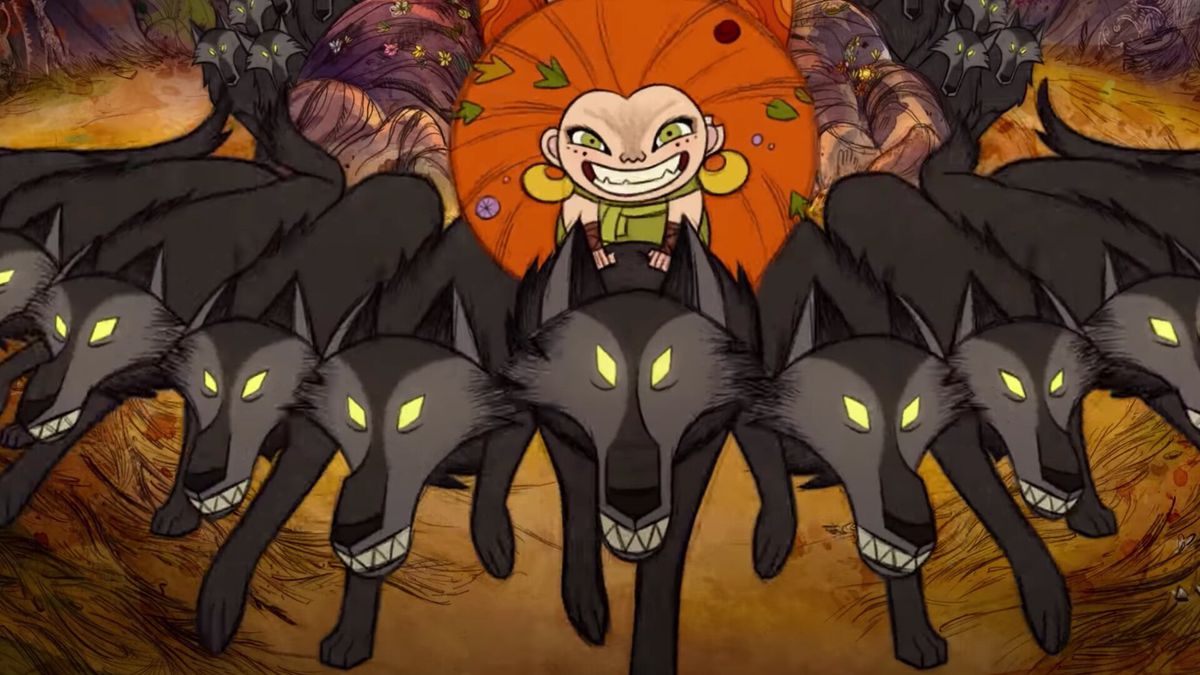Robyn’s exploits in the forest lead her to a wild-haired ginger girl who snarls and walks on four legs like a wolf. She’s revealed to be a wolfwalker named Mebh (Eva Whittaker), a wolf when she sleeps and a girl when she’s awake. In wolf form, Mebh excitedly nips Robyn, transferring her nature to Robyn. Ecstatic training sequences follow, led by the anarchic Mebh who takes Robyn tearing through the woods at night with her pack. Resigned to abandoning this part of the forest, Mebh is overjoyed to find a new friend to keep her company while her mother, in wolf form while her human form sleeps in their den, looks for a new place to live. Upon returning to the city as a wolf, Robyn is spotted and the alarm is raised, putting increased onus on Bill to stomp out the wolves at the same time that his daughter has become one herself.
Every one of Cartoon Saloon’s films has retained a hand-crafted aesthetic that looks like a cross between a mosaic and a pencil drawing and the progression into Wolfwalkers gives this style its highest point yet. This is a gasp-inducing film of incredible beauty, from the small scale charm of the runes on the walls of Mebh’s cave to stretched-out epic tableaus as the film reaches its action-heavy climax. Mebh herself is a wonder of animation, her giant poof of leaf-infested red hair waving through tree branches and underbrush and providing the perfect complement to her fierce personality. The animation frequently informs the tone and the visual themes of the film, with the city defined by sharp lines and the forest a tangle of free form trees and brambles. The wolf pack, a single organism made of individuals, is shown cascading over paths and jumping over cliffs as an undifferentiated mass. Wolfwalkers is full of these kinds of notes, each one accentuating the story in Cartoon Saloon’s unique way.
The awe generated by Wolfwalkers syncs with the other emotion it has by the bucketful; indignation. Bill and the other English characters are trapped into doing something that plainly makes them miserable. Their bodies know that their mission of domination, whether it be of nature or of the Irish, is unjust, but it’s also the means to the end of taking care of their families. That a miserable father might not be the best caretaker doesn’t enter into it, especially when resistance can mean getting put on the front lines. There’s always a worse, more dehumanizing job to do. Wolfwalkers contains a surprising thread about how people get stuck in corrupt systems that trade safety for complicity. As the embodiment of that system, the Lord Protector makes for a sensational villain. His directive of ‘what cannot be tamed must be destroyed’ is a colonial mission statement that defined several centuries of European history on the world stage. At the same time, one can imagine another impersonal tyrant above him, threatening his family if he doesn’t toe the line and do the job. Robyn’s and Mebh’s experience with this philosophy is seen through the angry tears of a child who cannot understand why things have to be the way they are, and it comes through so potently that it transports the viewer back to pre-cynicism.
Wolfwalkers races tongue-wagging and teeth-bared into the upper echelons of 21st century animated films. Tactile, evocative, and beautifully acted by its young novices and wizened professionals, it has a raw and wild energy to match its shaggy and rebellious protagonists. This is an artisanal product, and the love and craft is apparent on every frame. Moore and his colleagues at Cartoon Saloon have put their own stamp on the animation world and the broader cinematic world with this superlative effort. A

 RSS Feed
RSS Feed